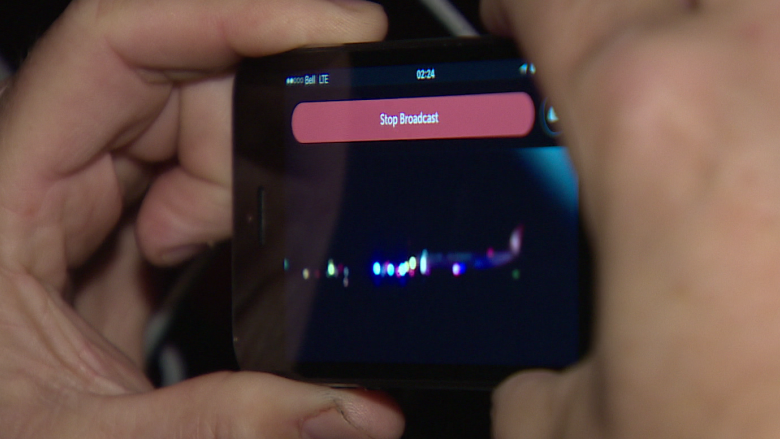Live streaming crime: How do we police the internet?
Social media documents almost everything people do these days, from the food they eat to their family vacations — but what happens when people start live streaming their crimes?
When three people were arrested after an assault and robbery were live streamed on the weekend in Winnipeg, the online response was disbelief, disgust and even amusement — but it's a growing trend, and the justice system will have to learn to deal with it, experts say.
"Why would someone videotape themselves committing a crime? To most of us, it sounds completely ridiculous," said Ari Waldman, associate professor and director of the Innovation Center for Law and Technology at New York Law School.
Waldman said there's a simple explanation for why more crime is being live streamed: The technology is better and more accessible, making it easier for more people to live stream anything.
"We have more people using the tech. As a result, we have more people using it in bad ways," he said.
The problem was acknowledged by Const. Tammy Skrabek at a news conference in Winnipeg on Tuesday, where she said officers arrested three people after someone watching the weekend live stream reported the assault to police.
"I think we are going to be seeing more of that in the future, and we are going to have, maybe, [to] put a little bit different resources now … into investigating these internet crimes and identifying suspects and ultimately arresting them," she said.
"We are still trying to figure out how we are going to follow up these investigations."
This isn't the first live streamed crime Winnipeg police have had to deal with, and the force isn't unique.
Last week, a 45-year-old Winnipeg man was charged after police discovered a live stream of a six-year-old boy being assaulted in the United States, allegedly under the Winnipegger's direction.
In March, a 27-year-old man in Saskatoon was in court facing charges for accessing child porn after he allegedly facilitated live streaming of child pornography in the Philippines and Romania.
In the U.S., four people in Chicago were charged in January after an attack on a mentally disabled man was broadcast live on Facebook.
And in March, a Facebook live stream showed what appeared to be the gang rape of a 15-year-old girl in Chicago. There have been two arrests in that case, and there is debate over whether the 40 people who watched the live stream — none of whom reported it — should be identified and charged.
The cases highlight the different challenges faced when grappling with crime that's documented online: crimes are committed across borders, witnesses watch from the privacy of their own homes, and social media companies each respond differently to online crime.
That's in addition to the practical difficulties of simply tracking down offenders who have only been witnessed online.
"This would be extremely taxing on law enforcement, to sit there and monitor all social media for any type of illegal behaviour. It's a very taxing job. It takes a lot of resources," said Daniel Tobok, an internationally recognized cyber security and digital forensics expert based in Toronto.
"It's basically like going fishing in a very big sea with a very small fishing hook."
There are no clear rules stating people must report crimes in Canada, although a little-used part of Section 22 of the Criminal Code says a person who "omits to do anything for the purpose of aiding any person to commit" a crime is a party to the offence. It is a crime to possess or create child pornography, and many provincial laws require people to report child abuse.
People must simply decide to do the ethical thing and report online crime, no matter where it's happening, both Tobok and Winnipeg police said.
"It really comes down to ethics. From an ethical point of view, if you see something that doesn't seem right, you should be informing law enforcement or informing, at minimum, the social media platform," Tobok said.
"We have to take a little bit of ownership."
What can be done?
Waldman believes there should be laws that specifically govern online crime.
There are real-life consequences for victims when crimes are live streamed, he said.
"To know that their harm has been distributed and seen by strangers, thousands, perhaps millions of other people could see something like this, just metastasizes the harm," he said.
Waldman also said the creators of the tools need to take more responsibility for the ways they are used.
While Facebook has denounced and taken down videos of crimes such as the two attacks that were live streamed in Chicago and companies can be compelled to provide information in criminal cases, Waldman wants such problems considered much earlier — starting with the design process.
"The problem that we have is technology companies are designing new technologies without fully appreciating the negative side, without fully appreciating how unsafe they can be," he said.
"The design of the technologies is essential in determining if it's something that is going to be safe."
For example, design teams are mostly men, and they tend not to consider how technology could be used in sexual assault and rape, Waldman said.
'We have to make a choice'
Consumers should also expect companies to design technologies with build-in protection so the tools can be used safely, he said.
However, Waldman thinks it's unlikely social media platforms will be made legally culpable, so he encourages consumers themselves to police people and platforms that live stream crimes.
"Platforms that have a history of not just allowing harassment to occur, but failing to do anything when they hear about harassment, we have to make a choice to not use those platforms," he said.
"We have to make the choice not to use those platforms and we have to encourage those platforms to actually act."



